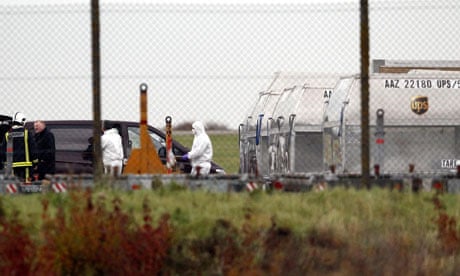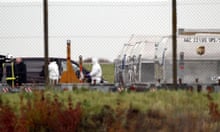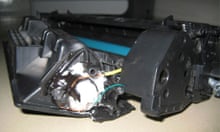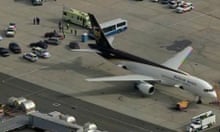Sophisticated bombs contained in packages sent from Yemen were designed to explode in the air and bring down the cargo planes carrying them, the government confirmed.
Intelligence experts believe the use of the devices, contained in printer cartridges on board two Chicago-bound cargo planes, represents a shift in terrorist tactics to commercial targets.
President Barack Obama phoned David Cameron to thank him personally for the UK's "close co-operation" in helping disrupt the bomb plot. The pair agreed that their countries' respective authorities would remain in close contact in the coming days, the White House said.
Speaking ahead of a meeting last night with the German chancellor, Angela Merkel, Cameron said: "We have to do even more to crack down and cut out the cancer of al-Qaida in Yemen and the Arabian Peninsula. We have immediately banned packages coming to or through Britain from the Yemen.
"In the end these terrorists think our interconnectedness, our openness as modern countries, is what makes us weak. They are wrong – it is a source of our strength, and we will use that strength, that determination, that power and that solidarity to defeat them."
Cameron also spoke to Yemen's president, Ali Abdullah Saleh, who later said that security forces had arrested a Yemeni woman in Sana'a in connection with the plot. Officials told Reuters that the woman, who is believed to be in her 20s, had been traced through a telephone number she had left with a cargo company. She was said to be a medical student at Sana'a University.
The woman's lawyer said that her client's mother had also been detained.
Both of the devices, one discovered in the hold of a plane that landed at East Midlands airport after flying from Cologne, the other on a plane in Dubai, were described as "extremely professional" by intelligence officials.
One was linked to a mobile phone, while the other was attached to a timer. The Observer understands that the East Midlands device was so sophisticated an examination by experts initially suggested it did not contain explosives. "Even when it was examined, the sniffer dogs couldn't detect it," a security source said. "It was only when they [forensic experts] had a second look at it they realised what it was."
It has emerged the devices were discovered only after a tip-off from Saudi intelligence. "This… started with good information from the Saudis," the US homeland security secretary, Janet Napolitano, said. "We were then immediately able to work with other countries, particularly the UK and the UAE, to segregate these packages, to begin the analysis about what they were, what they could have done."
If the devices had blown up over the Atlantic, or any other large stretch of water, identifying the cause would have been difficult because there would have been little trace left of the planes. But the discovery of the packages – addressed to two American synagogues – is a potentially vital weapon for the security services. "Now we've got them, we can figure out how they have been made, who made them and how to stop them," one source said.
The sophistication of the devices is likely to raise concerns about airport security. Investigators in Sana'a searched 24 other suspect packages, according to a security official. Authorities were also questioning cargo workers at the airport and employees of the local shipping firms contracted to work with commercial logistics companies.
The home secretary, Theresa May, said a preliminary examination of the device found at East Midlands airport had confirmed it was viable: "The target of the device may have been an aircraft and, had it detonated, the aircraft could have been brought down," she said.
"But we do not believe the perpetrators … would have known the location of the device when they planned for it to explode.
"At this stage we have no information to indicate another attack is imminent. The threat level is already at severe, meaning that a terrorist attack in this country is highly likely. We do not plan to change that threat level at this stage."
The Metropolitan police said "early indications suggest [the device] had the potential to bring down an aircraft in flight if detonated".
All unaccompanied air freight originating in Yemen and moving into or through the UK has been suspended.






